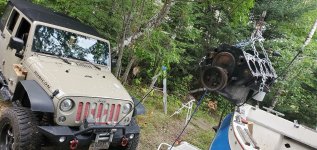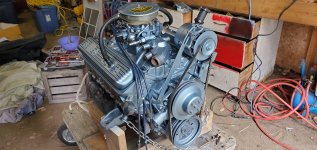well one other idea, is to have towing insurance that could cover such an inconvenience, I have this through Boat US, its actually quite reasonable, so if I had a problem like that I could get the boat/trailer flatbedded back home. However, not having a breakdown in the first place is even better. The part I am not exactly agreeing with is this:
on vehicles with permenantly lubed bearings (unit bearings) you check for roughness and play and replace when necessary
on I/O boats with gimble bearings you grease (if grease-able) and look for rusty grease coming out, and also feel for roughness, if you don't see/feel either you are not pulling those gimble bearings out...these can and will get contaminated with water and rust just the same as trailer wheel bearings....
and so, on the easy lube/super lube/spindle lube, you grease till all the old grease comes out, if you see rusty bits or emulsified grease and/or the bearing feels rough, you are replacing the whole works. BUT if you DON'T, why are you then pulling it apart? I think you can feel, and hear bad bearings just as well as you can see the wear, when you take it apart. I did that for 17 years, and at the end they were still fine.
Quite honestly, I would have LOVED to have super lube hubs on the front wheels of my old rear drive cars that I grew up with (VW Beetles, Full size GMs mid size Fords) rather than the messy dirty job of pulling them apart, every 30,000 miles. In fact one time on a mid sized Ford, I could easily hear bearing wear while cornering that you could barely see after taking it apart. The bearings themselves did not show wear, it was the races that had barely visible pits that was causing the pretty obvious noise.
One time we had the bearings done by a local alignment shop, they got one too damn tight and that caused a failure down the road where the wheel nearly came off! In the middle lane of I-95 no less, the disc caliper is the only thing that held it on. After that, I started doing all my own brake and bearing work.
And those old school Beetles, had this horrible adjustment system (pre '66) that used a locking plate and 2 nuts, that was a real pain to get right and the grease we had back then was that horrible smelling yellow fibrous crap, hand packing, etc. What we have today is 150% superior in my opinion.






















